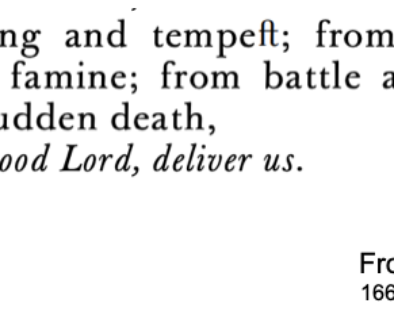Gentleness and the Call to Civility
We are coming to the conclusion of our summer sermon series on the Fruit of the Spirit. These are 9 characteristics that St. Paul listed out in Galatians 5: love, joy, peace, patience, kindness, goodness, faithfulness, gentleness, and self-control. Outside of a relationship with God, they are character traits that we admire in people and most of the world aspires to have more of these. But for those who have a relationship with God, these 9 traits are not a wish list of what would make someone a better person. These are the promised manifestation of the Holy Spirit’s presence in the life of one who follows Jesus. As we let Jesus lead more of our life, this fruit is what happens in us and what people notice about us. Christians aren’t ‘trying to be more joyful or patient’. No, they are trying to know God, trust Jesus, and be filled with the Holy Spirit– as those things happen, the fruit of joy, patience, and others comes out.
In talking about gentleness, I mentioned 2 universal relational realities that will always require gentleness but will always tempt us to choose a posture that is harsh and protective: relating to those with whom we disagree and relating to those who are far from their Father in heaven. In spite of our natural inclination, choosing to be gentle results in the possibility of real life change for those with whom we disagree and real ‘rest for your souls’.
There are 3 contexts where we could work on the fruit of gentleness, what the secular world calls ‘civility’. Civility in our households, in our interaction with those who choose to not belong to a church community, and in the public square. As I talked through those contexts, I quoted a variety of people who have thought deeply about the role of civility and gentleness in our day to day discourse.
In 2011, Tim Keller wrote about backlash and civility for his church newsletter. Keller gives some ‘rules for civility’ and helps us understand the historical scope of this conversation by interacting with Robert Putnam and David Campbell’s book American Grace: how religion divides us and unites us. That book has been very helpful to me as I imagine the kind of church that Restoration could be in the midst of hard and contentious cultural conversations.
In 2008, Os Guiness wrote The Case for Civility: and why our future depends on it. Os is so good at providing historical and societal context that is clear and persuasive. He argues that much of the answer to whether or not we’ll learn to live with our deepest differences depends on rejecting two erroneous responses to the culture wars. First, we must say no to a “sacred public square”—a situation where one religion has a position of privilege or prominence that is denied to others. We must also say no to a “naked public square”—the situation where public life is left devoid of any religion. This is what is advocated by the new atheists. The alternative to both is a “civil public square.” one in which everyone—peoples of all faiths, whether religious or naturalistic—are equally free to enter and engage public life on the basis of their faiths, as a matter of ‘free exercise’.
Tim Challies had a great interview with Os and developed some of these ideas more fully. It was helpful to me as we imagine Restoration as a place that promotes truth, embraces the reality of pluralism, trusts that the good news of the Gospel will rise above the cacophony of voices, and (maybe most important of all) refuses to demonize those with whom we disagree.
I hope having access to some of the original sources that I was quoting will help you as you talk to God about gentleness and choose civility as your posture with those whom you disagree. May God, by the presence of the Holy Spirit, use our opportunities to be gentle to make us more like Him.
-David

